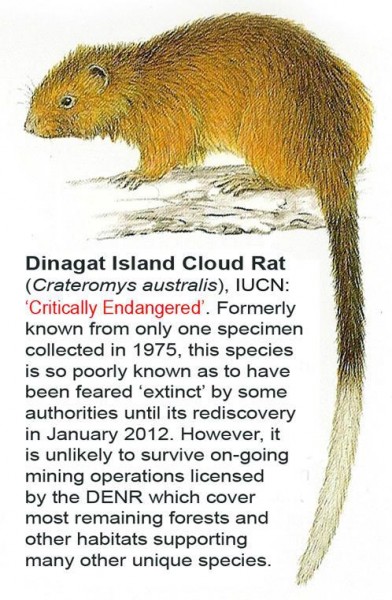Rat species thought extinct seen after 20 years
BACOLOD CITY—A cloud rat, endemic to one tiny island of the world—Dinagat Island—has been rediscovered after a more than 20-year search.
Dr. William Oliver, of the Philippine Biodiversity Conservation Foundation Inc. (PBCFI), on Sunday said the Dinagat cloud rat belongs to a critically endangered species and was even believed to be extinct until its rediscovery on Dinagat Island early this year.
The Dinagat cloud rat was observed and a video was recorded by a couple from the Czech Republic who were on their honeymoon, said Oliver, PBCFI director of program development and conservation partnership.
Zoologist Milada Reháková, who was commissioned by the PBCFI, and her husband, programmer Václav Rehák, spotted the Dinagat cloud rat, a huge, hairy gray-brown rat with black-white tail, in the island’s forest in January.
The couple were in a semi-protected watershed reserve site on central-north Dinagat Island to conduct a 10-day study on tarsiers and to collect information from residents on the possible existence of the Dinagat cloud rat, Oliver said.
Article continues after this advertisementThe work was prompted by previous surveys initiated by PBCFI, he said.
Article continues after this advertisementReháková has been involved in the conservation of Philippine fauna since 2007 and is a leader of the Tarsius project focused on the conservation of the Philippine tarsier.
While not much data on tarsiers were collected in the study site, the couple observed movements and unfamiliar calls of other species, which turned out to be the elusive cloud rat, Oliver said.
A lone cloud rat was observed climbing and foraging in the undergrowth and tree branches in three separate occasions, enabling the first sound recordings and both still and video documentation of the rare rat by Reháková and Rehák.
The first known specimen of Dinagat cloud rat (scientific name Crateromys australis) was collected in 1975 during one of the first surveys of Dinagat Island, led by the late Dr. Dioscoro S. Rabor, doyen of Philippine vertebrate zoology.
The same survey also led to the discovery of the Dinagat moon rat (Podogymnura aureospinula) and the discovery of other new Dinagat endemic mammals, including the Dinagat hairy-tailed rat (Batomys russatus). Both species are now classified as endangered by the International Union for Conservation of Nature, Oliver said.
The single cloud rat specimen was deposited in the American Museum of Natural History.
The species was feared extinct by some authorities as no other specimens were found during follow-up expeditions by trained investigators, Oliver added.
